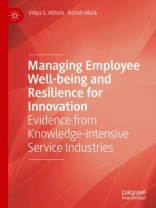This book employs a multidisciplinary and multi-level perspective to understand how well-being and resilience can influence innovation in knowledge-intensive contexts. Building on the authors’ work in the areas of innovation management, human resource management and the psychological aspects of employee well-being, rich empirical data is presented and analysed in order to develop a conceptual framework. An interdisciplinary and insightful read for those studying HRM, innovation and psychology, this book is aimed at scholars who are interested in examining the relationships between micro- (individual) and meso-level (organisational and managerial practices) influences on innovation outcomes.
قائمة المحتويات
1. Why Well-being, Resilience and Innovation?.- 2. Theoretical Foundations of Resilience, Well-being and Innovation.- 3. Meso-level Influences on Well-being, Resilience and Innovation: Creating an Ambidextrous Context through HRM.- 4. Quantitative Analysis.- 5. Within-case Qualitative Analysis.- 6. Discussion and Conclusion.
عن المؤلف
Vidya S. Athota is a Senior Lecturer in Business Psychology and Human Resource Development at the University of Notre Dame, Australia. He has published research in a number of leading international journals and has presented at international conferences. Vidya’s expertise includes management diagnostics and multi-perspective assessments in the areas of resilience, personality, and cognitive and non-cognitive skills. Vidya has also provided consulting services to various business organisations, including Fortune 500.
Ashish Malik is an Associate Professor at Newcastle Business School, the University of Newcastle, Australia. He has authored and edited six books and his work appears in a number of leading journals such as Industrial Marketing Management, JBR, IJHRM, Organisational Dynamics, IJM and JIM. Ashish serves as an Associate Editor of the Asian Business & Management Journal and is on the editorial review boards of Journal of Business Research and Journal of Knowledge Management.












